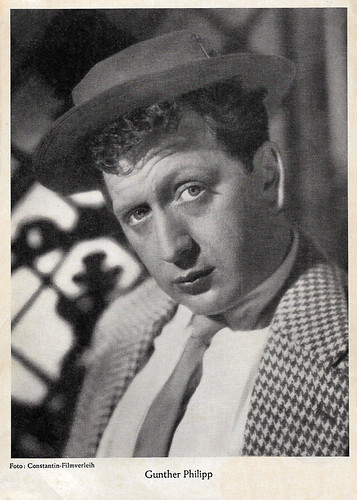
German card. Photo: Constantin-Filmverleih.

Austrian postcard by Austriapost, Wien, no. 188. Photo: Gloria-Film. Gunther Philipp in Kaisermanöver/Imperial Manoeuvres (Franz Antel, 1954).
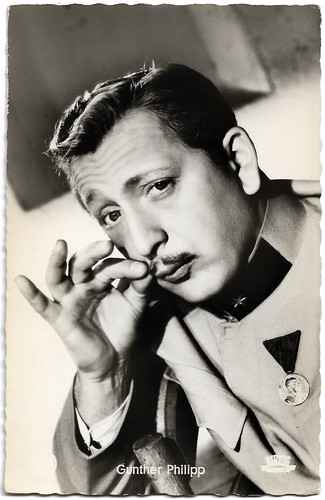
West-German postcard by Kolibri-Verlag G.m.b.H, Minden-Westf, no. 2337. Photo: Sascha / Herzog / Michaelis. Gunther Philipp in Kaiserjäger/Emperor Hunter (Willi Forst, 1956).
All kinds of silly or affectatious men
Gunther Philipp was born Gunter Placheta in 1918 in Maroshévíz, Austria-Hungary (now Toplița, Romania) where his father was stationed as a soldier during the First World War. His parents were the later veterinarian Hugo Placheta and his wife Therese. Soon after his birth, the family returned to their home town of Vienna.
Philipp received his schooling in Vienna and in Innsbruck. He was a successful swimmer and held the Austrian record in the 100-meter breaststroke for 14 years. He was also in the squad of the Austrian Olympic team in Berlin in 1936 but was not nominated for political reasons because he did not want to join the National Socialist-dominated 'Erste Wiener Amateur Sport Club' (First Vienna Amateur Sports Club).
During World War II, Philipp studied at the University of Vienna philosophy, majoring in psychology and then medicine. In 1943, he completed his thesis during his military service in a military hospital. After the war, he ran a practice in Eberstalzell in Upper Austria and was active until the 1990s at the Vienna University Clinic for Neurology and Psychiatry.
One of his patients in 1946 was the actress Paula Wessely. During the Second World War, Günther Philipp also studied acting at the Max Reinhardt Seminar. In 1946, together with Peter Wehle and Fred Kraus, he founded the cabaret group 'Die kleinen Vier'.
In 1949, Günther Philipp made his big screen debut in the film Märchen vom Glück/Kiss Me Casanova (Arthur De Glahs, 1949) starring O.W. Fischer and Maria Holst. At the end of 1949, he gave up being a doctor and worked mainly as an actor or presenter. He became known for his roles in comic films such as Kleiner Schwindel am Wolfgangsee/A little swindle at Lake Wolfgang (Franz Antel, 1949) with Hans Holt and Tante Jutta aus Kalkutta/Aunt Jutta from Calcutta (Karl Georg Külb, 1953). He portrayed all kinds of silly or affectatious men from aristocrats to obsequious servants.
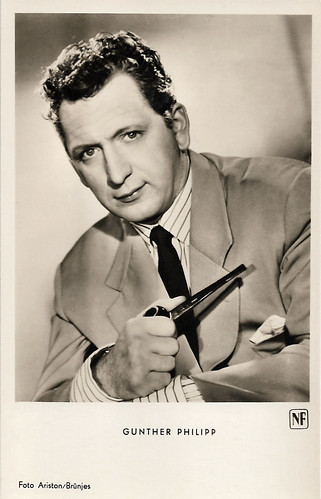
German postcard by Kunst und Bild, Berlin, no. A 864. Photo: Ariston / Brünjes / NF. Gunther Philipp in Tante Jutta aus Kalkutta/Aunt Jutta from Calcutta (Karl Georg Külb, 1953).

German postcard by Kolibri-Verlag G.m.b.H., Minden/Westf., no. 2047. Photo: Rhombus / Herzog-Film / Appelt. Gunther Philipp, Paul Hörbiger and Joachim Fuchsberger in Lumpazivagabundus (Franz Antel, 1956).

German postcard by Kolibri-Verlag G.m.b.H., Minden/Westf., no. 2327. Photo: Berolina / Constantin / Wesel. Gunther Philipp in Die Christel von der Post/Christel from the Post Office (Karl Anton, 1956).
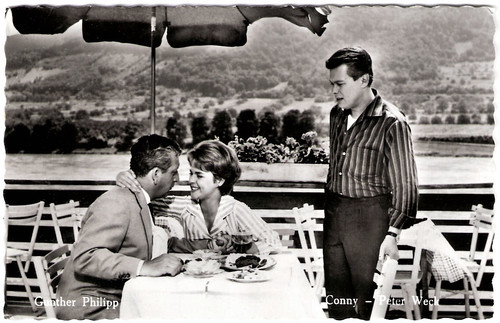
Dutch postcard by N.V. v.h. Weenenk & Snel, Baarn, no. 762. Photo: Gunther Philipp, Conny Froboess and Peter Weck in Mariandl (Werner Jacobs, 1961).
His own motorsport racing team
In the 1950s and 1960s, Gunther Philipp became one of the most popular and busiest German-speaking actors. He had roles in films such as Kaiserwalzer/The Emperor Waltz (1953), Kaisermanöver/Imperial Manoeuvres (Franz Antel, 1954) with Hans Moser, Kaiserjäger/Emperor Hunter (Willi Forst, 1956) and also in Ernst Marischka's Die Deutschmeister/A March for the Emperor (1955) with Romy Schneider.
Later, his popularity resulted in appearances in the musical Im weißen Rössl/The White Horse Inn (Werner Jacobs, 1960), and Mariandl (Werner Jacobs, 1961). His films with Peter Alexander such as Schwejk's Flegeljahre/Schweik's Awkward Years (Wolfgang Liebeneiner, 1964), he enriched with his specific comedy and became well-known. In total, he appeared in 147 film and television roles.
Along the way, he also wrote countless programmes for radio and 21 screenplays for films. He was also successful in the theatre. He maintained a strong interest in medical topics throughout his life and read the corresponding professional journals. In the 1950s, Philipp founded his own motorsport racing team Ecurie Vienne and competed in the Gran Turismo class. He became the Austrian national champion several times in the 1960s.
After the end of his active career, he co-hosted the TV programme Motorama with Jochen Rindt and after the latter's death, he hosted it alone. He was married four times and was the father of three sons, Peter (born 1943), Alexander (1967), and Gero (1983).
In 2003, Gunther Philipp died in a clinic in Bonn-Bad Godesberg after many years of illness at the age of 85. His grave is in the Melaten cemetery in Cologne, in the immediate vicinity of fellow actors Willy Birgel, René Deltgen as well as Gisela Uhlen, whose husband he had played in the popular TV series Forsthaus Falkenau until his death. After he had often shot films in the Wachau, a museum was set up for him there - in the Hotel Mariandl, the location of the film Der Hofrat Geiger in Spitz on the Danube in Lower Austria.

German postcard by Rüdel-Verlag, Hamburg-Bergedorf, no. 2022. Photo: Arca / Constantin / Grimm. Gunther Philipp in Das Mädchen ohne Pyjama/The Girl Without Pyjamas (Hans Quest, 1957).
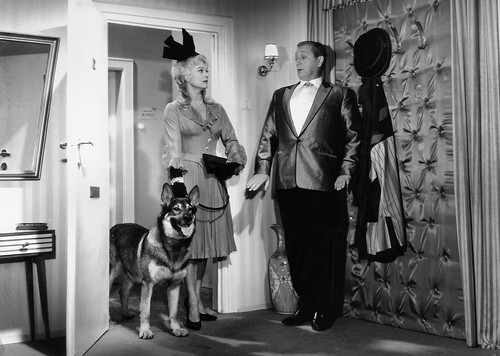
German press photo. Marika Rökk and Gunther Philipp in Hochzeitsnacht im Paradies/Wedding Night in Paradise (Paul Martin, 1962).
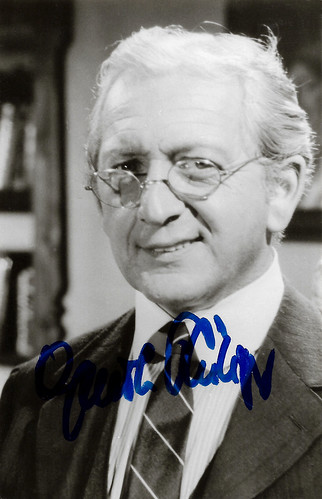
West-German autograph card.
Sources: Wikipedia (English and German), and IMDb.
No comments:
Post a Comment